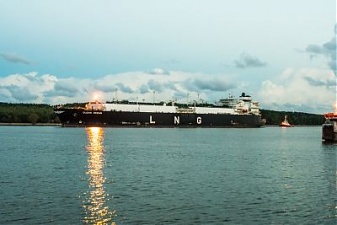Baltic States – CIS, Energy, EU – Baltic States, Gas, Latvia, Lithuania
International Internet Magazine. Baltic States news & analytics
Saturday, 20.04.2024, 18:03
Ex-ambassador: Lithuania broke its promise to Latvia over LNG terminal
 Print version
Print version |
|---|
"I had no serious arguments in defense of Lithuania's policy. I do not
know why it was decided not to fulfill the promises made to the Latvians,"
Antanas Valionis, who at that time
served as Lithuania's ambassador to Riga, wrote in his new book entitled
"In the Political Pendulum".
However, Andrius Kubilius, who
served as Lithuania's prime minister between 2008 and 2012, says that no such
promise was made to Latvia and that the neighboring country's government had no
intention of building a such terminal.
According to the conservative politician, it was a privately-owned company
linked to Gazprom that sought to develop a LNG terminal project in Latvia, a
plan that was at that time unacceptable to the then government of Prime
Minister Valdis Dombrovskis.
Valionis says in his book that it was agreed during Dombrovskis' visit to
Lithuania in 2009 "that a power interconnection with Sweden will be built
from Klaipeda and we in return will help the Latvians to obtain about 45
million euros from the EU for reinforcing their western electricity grid and
that we will jointly build a regional liquefied natural gas terminal near Riga
using Brussels' money".
"However, we built a huge (LNG) terminal in Klaipeda, whose capacity
is well above Lithuania's needs, and the Baltic region no longer needs a second
one. We damaged our relations with the neighbors for a long time," he
wrote.
The former Lithuanian prime minister gives a different account of the
situation.
"I'm not aware of any promises. I found none when I came to the
government in 2008. On the contrary, the Latvians an Estonians said that their
states, their governments did not want to build a terminal," he told BNS.
According to Kubilius, there were private initiatives for building a LNG
terminal in Latvia and "(Juris)
Savickis, a well-known Latvian businessman who was at the helm of Itera,
which was a subsidiary company of Russia's Gazprom, tried to put these
(initiatives) into practice".
"In other words, it was Gazprom
that planned to build a terminal in Latvia, I don't know if Valionis knew about
this. It seemed absolutely inappropriate for us, and the government of
Dombrovskis itself did not like the Latvian plan at that time", the former
prime minister said.
"Therefore, having realized that Latvians were not planning to build a
terminal, and neither were Estonians, we decided that such a terminal was
absolutely necessary for us and we took up the initiative. Perhaps Valionis is
not entirely accurate in his memories," he said.
The former ambassador describes Lithuania's energy policy that allegedly
ignored Latvia's interests as a mistake made by Kubilius and President Dalia Grybauskaite.
"The LNG terminal, whose capacity is at least double what Lithuania
needs, may become regional and pay for itself in the future, but we have to
wait until the Latvians forget what we promised them and how we deceived
them," he wrote.
Kubilius insists that no promises were given to Latvia regarding a regional
LNG terminal, adding that the neighboring country's government showed no
interest in building one at that time.
"Definitely not. On the contrary, Dombrovskis said that they were not
interested in the terminal and Estonians said that they were not interested
either. It was only after the European Commission announced that it would
provide money for a regional terminal that some interest emerged in Latvia and
Estonia, but we said that we were not interested in the European money at that
time," he said.
Valionis served as Lithuania's foreign minister between 2000 and 2006 and
as the country's ambassador to Latvia between 2008 and 2011.
Following years of disagreement, Vilnius and Riga agreed in 2009 that the
cable from Sweden would be built to Lithuania, rather than to Latvia. The three
Baltic prime ministers in April 2009 signed a respective agreement. The
Lithuanian government's press release issued on that occasion made no mention
of a gas terminal.
Subsequently, Latvia repeatedly called on its Baltic neighbors to agree on
a joint LNG terminal in Riga that could qualify for EU funding, but no deal was
reached.
After Lithuania began to build a LNG terminal in Klaipeda on its own, the
Latvian government accused Vilnius of derailing the regional project. Latvia
later blocked Lithuania's efforts for the Klaipeda terminal, which was already
operating, to be recognized as a regional project and provided EU funding.
The Lithuanian government says that the Klaipeda terminal had to be built
urgently to strip Russia's Gazprom of
its monopoly and that talks with Latvia would have significantly delayed the
project. According to Lithuanian officials, the Klaipeda LNG terminal was the
key argument that helped to obtain a gas price cut from the Russian supplier.








 «The Baltic Course» Is Sold and Stays in Business!
«The Baltic Course» Is Sold and Stays in Business!

